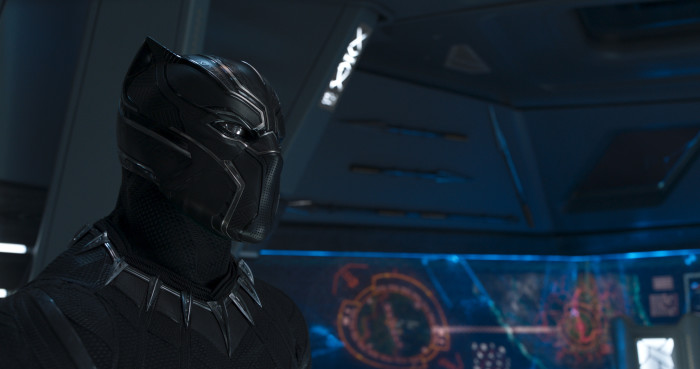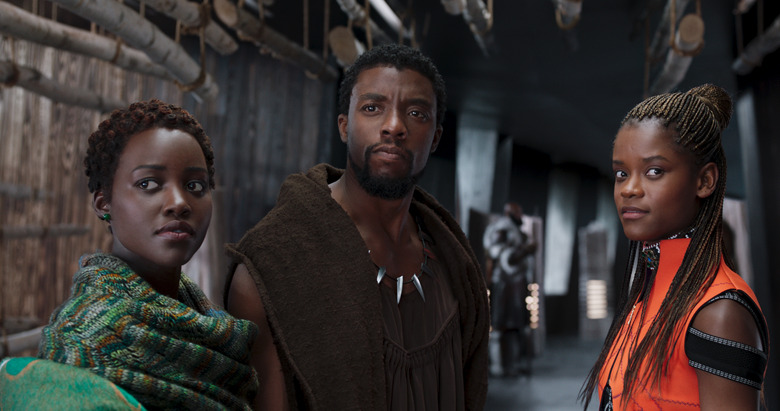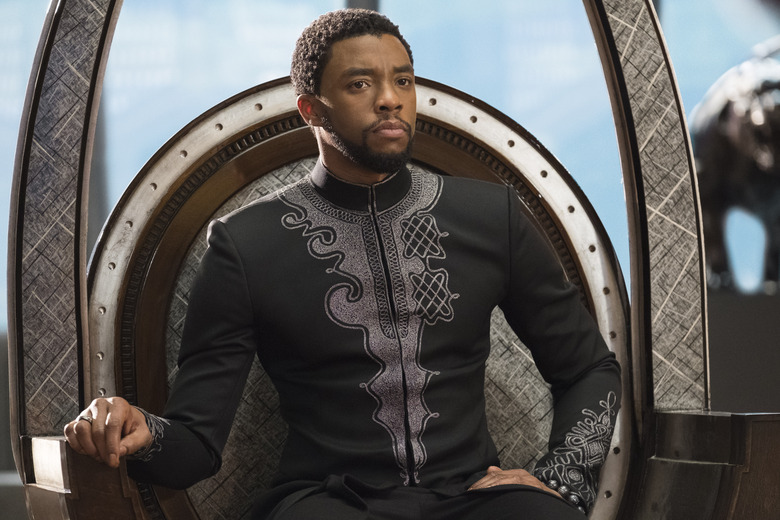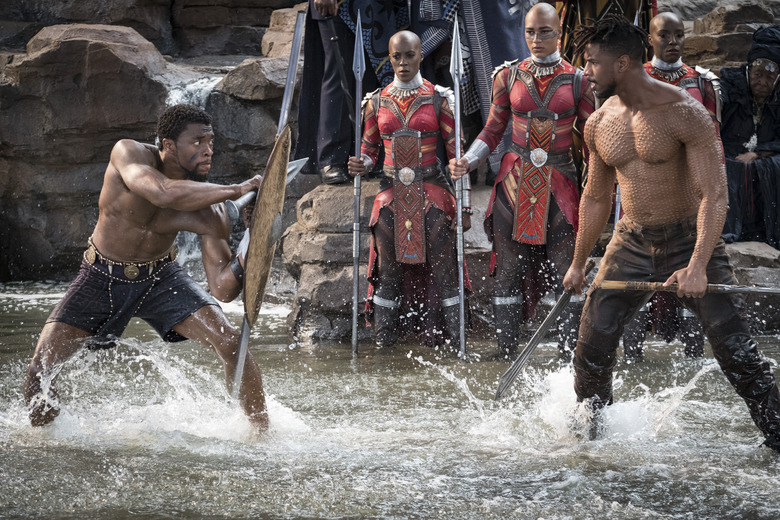Why African American Audiences Are So Connected To 'Black Panther'
I'm sure you've seen the various memes and social media conversations featuring African-Americans writing waxing poetic about Black Panther. Between many trying to figure out what they're going to wear to their midnight screenings, organizations and individuals raising money to buy thousands of movie tickets for kids across the country, and hashtags like #WhatBlackPantherMeansToMe, you'd think this film was about a notable real life figure, not a fictional superhero.
But, as is often the case, fiction reflects real life. For many black Americans, Black Panther is more than a blockbuster movie. This is something bigger than the Marvel Cinematic Universe. For many black viewers, Black Panther will be a major dream deferred finally realized. For the first time in the MCU, us black fans will finally have a film that features characters who not only look like us, but feel many of the hopes and anxieties specific to the African-American experience.
Marvel’s racial drought
You don't need me to tell you that Marvel has been lopsided in terms of its racial representation. In fact, calling it "lopsided" is being kind. Except for Black Panther, all of the superheroes who have led feature films in the MCU have been white men.
The issue gets compounded when Marvel seems like it's more committed to showcase people of color and women in secondary or background roles. While Nick Fury is the glue that holds the MCU together, he's still a character that toggles between secondary and tertiary status. The more popular black superheroes, like War Machine and Falcon, are, indeed, cool. But they are also still second to their white friends, Iron Man and Captain America. They back up the white superheroes, sometimes act as their conscience, and are utilized as a soundboard for their ideas. In short, these black superheroes do a lot of emotional legwork for their friends, while the script doesn't often write the white superheroes reciprocating much of that emotional labor back.
What's unfortunate is how used we all are to this. It's normal for black audiences to just hope a black character gets enough screentime and doesn't die at the end, the latter of which was a real fear I had going into Captain America: Civil War. After all, War Machine's paralyzing crash was heavily marketed for emotional exploitation. We are used to seeing ourselves as the "friend," the "sidekick," that character that is important enough to be in the top billing, but still not important enough to carry the film. After years and years of this, the anger and sadness of this reality dissipates into resignation, because it's too tiring to be angry forever.
Ironically, where the MCU has failed, Marvel's TV offerings have succeeded, albeit in random bursts. Shows like Agent Carter, Jessica Jones, Luke Cage, and Agents of S.H.I.E.L.D. have all had men and women of color and women in general in starring roles. For many, these shows are a breath of fresh air in a sea of otherwise monotonous superheroes. But even still, Marvel seems to shoot itself in the foot.
Despite critical acclaim and a dedicated core fanbase, Agent Carter was cancelled, ending Marvel's foray into providing women quality superhero entertainment until the announcement of Captain Marvel and Black Widow movies going into production. Marvel's biggest failure to date has been Iron Fist, a show many AAPI fans felt squandered an opportunity to bring in an Asian actor to portray Danny Rand and make the source material feel a little more respectful of the culture from which it borrows. The decision to cast Finn Jones as an uncharismatic Danny was put in stark relief to the casting of Lewis Tan as Iron Fist's nemesis Zhou Cheng, whose wit, charm, and actual fighting skill won over viewers and made many question why Marvel neglected Tan, who did audition for the lead role.

Marvel's Iron Fist debacle reflects the company's reticence to go outside of their "comic book canon" norms. Thankfully, it seems like that reticence is fading; Spider-Man: Homecoming was a hit for finally showcasing Peter Parker as a young high school student in the modern, diverse borough of Queens. Thor: Ragnarok pushed Marvel's space odyssey trappings even further than the Guardians of the Galaxy series by including more psychedelia, a delightfully zany Jeff Goldblum, and offbeat humor. Director Taika Waititi, whose background and unique point of view, partly informed by his Indigenous heritage, gave fans the Thor film they didn't know they needed.
While Marvel is currently reveling in claiming the title of "most woke franchise" thanks to Black Panther, the irony is that Marvel's reticence nearly cost them this critical and box office boon. For years, fans hounded Marvel for a Black Panther movie, only to be met with excuses, particularly the excuse of Wakanda somehow being hard to make, despite Thor introducing us to an otherworldly Asgard.
Perhaps some of that reticence comes from not wanting to get important characters like Black Panther wrong; one false move, and you've alienated much of your base. That can be seen with Iron Fist, but also with Doctor Strange, a film that tried its best to avoid controversy, but still walked into a big mess by casting Tilda Swinton in a role that would have been better suited for an Asian actor. Even the casting of Benedict Cumberbatch as the lead was called into question, since the character, like Danny, perpetuates the antiquated notion of a white guy somehow mastering ancient techniques rooted in Asian mysticism better than actual Asian practitioners, thus becoming their savior.
Still, it's better to try than not at all. It's good that Marvel still went ahead and tried with Black Panther. Even better, it's good to see they knew they needed outside help to make this film work. By seeking out Ryan Coogler as well as the astounding cast and crew, Black Panther has turned into more than just a tyipical superhero film with a black guy jammed in as the lead. From critics' accounts, it's a true tour-de-force of pan-African visuals, costuming, traditions, and salient commentary on the effects of colonialism on the African diaspora as a whole. The film is already rewiring how African-Americans see themselves, as well as how others view Africa. In short, it's the power of representation at work. That feeling of empowerment is something white superheroes (and white audiences) have had a monopoly on for decades. It's about time the scales start to shift towards balance.
A new way to see Africa
America is overexposed to depictions of a stereotypical Africa. If you ask most Americans, the first images they'll think of when contemplating Africa are starving children, huts, poverty, and civil war. However, there's much more to Africa than what we Westerners have been shown. Each of Africa's nations tell a story of power and each have their own rich history, traditions, and cultures. From Kigali, Rwanda to Tunis, Tunisia, there are many metropolises in Africa, attracting global expats each year. But Africa's gifts routinely fly under the radar and we hardly ever see positive portrayals of the continent in our popular media. This lack of representation affects all Americans more than they probably know, but it definitely affects us African-Americans, who are constantly dealing with the ever-present battles against stereotypes, racism, and the lasting effects of slavery.
If you think about it, the last time we've seen an African nation depicted as something beyond the standard stereotypes in Hollywood was 1988's Coming to America, starring Eddie Murphy as the prince of the fictional nation Zamunda. The effect the film had on African-Americans are still felt today; it was the first time I, as a child, ever remembered seeing black people as royalty.
That experience is something even first generation African-Americans hold dear. In 2013, The Root interviewed several first generation African-Americans about their views on Coming to America, and many of those interviewed spoke of the film in glowing terms."The movie portrays African royalty, which is powerful, giving the predominant stereotypes of Africa – à la National Geographic," first generation Ghanaian-American Shaun Ossei-Owusu told The Root, referencing programming that focuses on emaciated African children. Another Coming to America lover, Omari Wallace, who is part Barbadian and part African-American, told The Root film "gave me the most majestic portrayal of Africans I'd ever seen, outside of ancient Egyptians."
The place Coming to America holds in black America's hearts allows it to have connective tissue to Black Panther. Of course, there's the obvious – this another rare mainstream film about African royalty – but there's also the amount of pride that these movies provide to their fans. When I watch Coming to America, I come away feeling like I've been affirmed; too often, the mainstream chides black people for believing higher than their supposed station in life, but Coming to America let me and others know that it's more than all right to imagine yourself as regal, powerful, and as someone who commands respect. Through Coming to America, I came to understand more about my own African heritage and that I can see myself beyond the limited box America wants to put people like me in.
A new way to understand the unique African-American experience
It's hilarious when some people ignorantly say how it must be easy to be black, when it's anything but. One of the core existential stressors we have is our struggle to feel like we belong. Often, we are discriminated against, either directly or indirectly, by the government, by local and state law enforcement, the justice system, and by others in our communities. Even worse is that we can also experience discrimination from others within our own diaspora, including some African immigrants who believe the stereotypes about African-Americans told to them through exported media. In some ways, we even reciprocate that discrimination, something that's actually addressed in Coming to America, when Darryl (Eriq La Salle) makes bigoted jokes about Akeem (Eddie Murphy) playing with wild animals in Africa. It's within this push and pull between varying facets of identity that blackness as a construct emerges, and with it comes a sense of discovery about who we really are individually and where we fit into society.
This sense of discovery is what director Ryan Coogler himself embarked upon when writing Black Panther. Coogler visited Africa for the first time in order to better understand the continent he would be utilizing, telling Variety, "I have to go if I'm making this movie. I'm not qualified just because I look like this." The journey was more than just geographical; for Coogler, it included a meditation on the relationship between African-Americans and the rest of the African diaspora. "For me, in retrospect, I realized a lot of what I deal with as an artist is with themes of identity," he said. "I think it's something common among African-Americans. For us, we've got a strange circumstance in terms of our view of ourselves."
The push and pull of cultural identity seems to manifest itself in the physical forms of T'Challa and Kilmonger, who both hope for belonging, but are defined in very different and unique cultural and societal ways. While T'Challa has been raised in Wakanda and is informed by its isolationism, Kilmonger grew up in America, experiencing the country's racism and discrimination. The two are at war over the Wakandan throne, but they are also having a harsh conversation about black identity. The vastness of the black experience is something that can't be whittled down into just one overarching idea. It encompasses a history of subjugation as much as it encompasses the wide scope of African empowerment. Everything that falls in between those two extremes are valid forms of blackness, and that exploration of what it means to be black appears to be at the heart of Black Panther. As Coogler said to Variety, a white director wouldn't have made a film discussing these difficult topics.
"Well, is it possible for them to make [a Black Panther movie]? It could be, yes. Would they have this perspective? Probably not," he said. "It wouldn't be nuanced in the same way because they wouldn't have the same conflict. They don't have the African-American conflict that exists: Whether you're conscious of it or not, you have ancestry that is very hard to trace."
At this point, it should be easy to see why Black Panther is so important. The storytelling goes beyond the usual Marvel flash and flair. This is a fantasy story with ramifications set in real world politics and social experiences. It's a film that speaks to the heart of what makes the varied African-American experiences both magical and painful. It's a film that finally showcases not just a collection of black bodies, but a much-needed examination of blackness as an identity, a heritage, and as a collective consciousness. It shows us as multifaceted, and having all of our facets portrayed on-screen is something that is so monumental in its rarity.
Let's hope Black Panther inspires more studios to "bet on black" and bring our experiences to the screen. Black Panther can't be the last time we see ourselves in full regalia.



